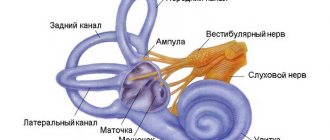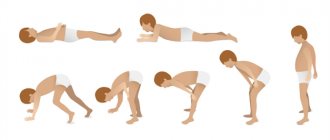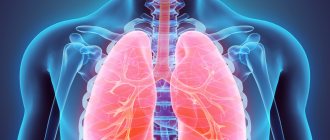Types of morning dizziness
Malaise is classified according to type and frequency of occurrence. In the first case, the disease occurs:
- light;
- permanent;
- growing;
- transient.
By frequency of occurrence:
- systemic;
- non-systemic.
The symptoms of systemic dizziness are similar to the sensations after riding a carousel. A person feels like the earth is gradually disappearing from under his feet, his gaze cannot focus on individual things, objects “float”. The cause is problems of the vestibular apparatus.
Non-systemic ones include weakness, fainting, sensations when it gets dark in the eyes. The causes are atherosclerosis, intervertebral hernia, stress, nervous condition.
Pinched nerves and blood vessels
This process disrupts blood flow to the brain, as a result of which the functions of the vestibular apparatus suffer. The causes of pinched nerves and blood vessels are as follows:
- uncomfortable posture during sleep;
- pathologies of the spinal column;
- thinning of blood vessels due to old age and accompanying ailments;
- osteochondrosis;
- The pillow is too high.
To begin with, you should try simply changing the pillow to a low and soft one. This step alone will help reduce the degree and intensity of dizziness in the morning.
Causes of morning dizziness
If a person feels dizzy after sleep, this indicates possible abnormalities in the functioning of the cardiovascular system, diseases of the neurology, and auditory organs.
Symptoms:
- sensation of rotation of surrounding objects;
- lightness of mind;
- circles, dots before the eyes;
- nausea.
With morning sickness, dizziness begins immediately after waking up.
If you feel dizzy and shaky in the morning, possible reasons are as follows:
- Lack of blood sugar. Applies to women who regularly adhere to strict diets.
- Vegetovascular dystonia, causing vasoconstriction.
- Low pressure.
- Cervical osteochondrosis. As a result, the nerves in the neck area are pinched and the flow of lymph to the brain becomes difficult.
- Pregnancy.
- Anemia.
- Otitis.
Morning dizziness is sometimes associated with pinching of nerve endings at night. For this reason, blood does not flow to the head in the required quantity. This happens due to an uncomfortable pillow, incorrect body position during sleep. Collectively, this leads to cervical osteochondrosis.
Elderly people often complain that they feel dizzy in the morning. The cause is thinning of blood vessels and poor functioning of the vestibular apparatus.
Among the more serious causes of dizziness are epilepsy, brain tumors, and multiple sclerosis.
Diagnosis and treatment
First of all, the patient should make an appointment with a neurologist and cardioneurologist and talk about his unpleasant sensations, especially indicating when the attacks appear - more often in the early morning or at night, whether nausea bothers him when changing position, and whether there are other negative symptoms.
A neurologist usually prescribes examinations:
- X-ray diagnostics of the cervical spine;
- Dopplerography and vascular angiography, CT;
- MRI.
When examining a patient, the specialist asks how long the dizziness continues in the morning, what medications the patient takes to get rid of it, and whether he suffers from concomitant diseases. All this is done to prescribe the correct treatment.
Complex drug therapy is accompanied by a diet that includes essential vitamins and minerals, as well as foods that prevent nausea and vertigo.
For those suffering from dizziness, breakfast is a must. It is advisable to give up coffee, tea and cigarettes. In most cases, if you follow general recommendations, attacks of vertigo cease to remind you of themselves.
Which doctor should I contact if I have dizziness? There is a simple rule that will help you determine the right specialist:
- if there are signs of high blood pressure, a connection with stress, symptoms of facial redness, the presence of hypertension - then see a therapist or cardiologist;
- in the event that there is a “carousel phenomenon”, accompanying ringing in the ears – see an otoneurologist;
Dizziness may be accompanied by ringing in the ears
- if there are signs of cervical osteochondrosis, neck pain, numbness, transient visual disturbances, nausea and vomiting, then see a neurologist;
- and if attacks of dizziness occur against the background of acute or chronic otitis media, then you need to contact an otolaryngologist, since in this case, we can talk about labyrinthitis, or inflammation of the inner ear.
Various medicinal and non-medicinal methods are used in the treatment of dizziness. So, the following drugs are used:
- histamine receptor agonists (betahistine, betaserc);
- antinausea and antiemetics (metoclopramide);
- drugs to improve cerebral circulation (vinpocetine);
- nootropic drugs (piracetam).
A drug that improves cerebral circulation
In the event that dizziness is caused by processes in the vestibular receptors or osteochondrosis, then exercise therapy and special gymnastics are of great importance, which gradually leads to the fact that in patients with benign positional vertigo the condition is normalized. This gymnastics is called vestibular gymnastics.
In conclusion, it must be said that factors that improve sleep have a very important effect. Thus, moderate evening activity and walks in the fresh air help to cope with brain hypoxia and overcome dizziness when it occurs in the initial stages of cerebral atherosclerosis and osteochondrosis.
The most effective homeopathic remedies against dizziness in the morning include:
- Cocculus – improves cerebral circulation, relieves dizziness in the morning.
- Lachesis – relieves dizziness and improves well-being.
- Nux vomica – fights headaches and dizziness.
- Phytolacca americana – relieves morning dizziness after getting out of bed.
- Tellurium (Tellurium metallicum) – treats dizziness immediately after waking up.
- Trillium pendulum - helps relieve dizziness in the morning.
about the author
To get rid of vertigo, you need to eliminate the causes of its occurrence. After examining the patient, treatment can be carried out at home, on an outpatient basis, or with the person hospitalized in a hospital. Depending on the factors leading to dizziness, patients are advised to:
- for arterial hypertension, when there is a strong rise in blood pressure, a therapist or cardiologist selects antihypertensive pills. The most commonly prescribed are Enalapril, Enap, etc.;
- in case of positive vestibular tests and accompanying ringing in the ears, the patient is examined by an otoneurologist;
- for osteochondrosis, treatment is carried out by a neurologist. In the acute period of the pathology, the patient is advised to remain in bed with limited physical activity, as well as the use of anti-inflammatory drugs. After stabilization of the condition, preventive therapy, etc. is carried out.
Every patient with vertigo is advised to eat a balanced diet. In food, reduce the amount of salt, fried, spicy and fatty foods. It is preferable to feed patients with dizziness fruits, vegetables, nuts and lean meats. Be sure to exclude bad habits - a person should not drink alcohol or smoke.
Medicines can eliminate the unpleasant symptom and prevent its occurrence in the future. The most commonly used groups of drugs are:
- histamine receptor stimulants - Betaserc and Betahistine. Activation of histamine receptors leads to the disappearance of dizziness and a decrease in the severity of other clinical manifestations of vertigo;
- antiemetics (Ondansetron and Metoclopramide) relieve nausea and vomiting;
- for osteochondrosis, when the neck and back of the head begin to hurt, anti-inflammatory non-steroidal drugs are prescribed - Ketorol, Nise, etc.;
- nootropics (Phenotropil, Piracetam) and drugs that improve cerebral circulation (Actovegin, Vinpocetine) are used for atherosclerosis of the cerebral arteries, after traumatic brain injuries, etc.
Medicines are prescribed only by the attending physician. This is especially important if dizziness occurs during pregnancy. All medications have contraindications, non-compliance with which causes side effects of therapy.
In addition to taking medications, the patient must do therapeutic exercises and attend massage treatments. In the absence of acute inflammatory processes in the body, physiotherapy is carried out aimed at preventing relapses of the pathology.
Manifestation of vertigo
Constantly occurring symptoms of loss of orientation in space are called “vertigo”. The condition manifests itself in unpleasant sensations of rotation of surrounding objects, the person sways, and feels sick.
Regular manifestations of vertigo cause disorders of the nervous and vestibular systems.
In all parts of the human body there are receptors responsible for the coordination of movements. Vision and the brain play a fundamental role in this.
As soon as disturbances in the functioning of these receptors occur in the body, impulses are sent to the brain cells, causing dizziness.
When should you see a doctor?
If an attack occurs again, it is necessary to donate blood for examination. Situations in which mandatory medical care is required:
- numbness of the arms and legs, impaired sensitivity;
- high body temperature, the appearance of a gag reflex;
- vertigo along with headaches;
- muscle weakness. This is a situation in which the patient is unable to make any movements;
- heart failure;
- Enlargement of the tongue to such a size that it begins to interfere with the mouth.
If in the presence of these situations you do not seek qualified help, the condition can be critical, even pre-stroke. To make a diagnosis, you will need to see several doctors: endocrinologist, cardiologist, neurologist, ophthalmologist.
Mandatory procedures include:
- Biochemical blood test.
- X-ray, tomography, cardiography.
- Dopplerography of blood vessels.
- Magnetic resonance imaging.
- Ultrasonography.
If a child has problems, you should contact your pediatrician.
What to do if you feel dizzy after sleep
People who are faced with a problem need to know what to do if they feel dizzy and unsteady in the morning. First you need to improve your daily routine and diet. Dietary restrictions and forced fasting have a negative impact on health, leading to vitamin deficiency and loss of strength. A healthy sleep of at least 7 hours a day is recommended.
After a person wakes up, he should not immediately get out of bed. It is better to lie down for a while, then carefully, without sudden sudden movements, stand up, leaning on your elbows.
If symptoms persist, it is necessary to undergo a full examination. The therapist will refer the patient for an X-ray of the cervical spine or Doppler ultrasound of the blood vessels.
A complete blood test will help understand the cause of your symptoms. An MRI is prescribed to identify possible tumors in the brain.
Urgent consultation with a doctor is necessary if, in addition to dizziness, there is nausea, headaches, vomiting, and numbness of the extremities.
Medications to combat dizziness in the morning
A neurologist may prescribe the following medications:
- “Cinnarizine” has an excellent vasodilating effect and regulates blood circulation in the brain.
- “Phenibut” will help overcome sleep problems, give you sound and healthy sleep even during periods of stress, and relieve migraines and dizziness.
- “Magne B6” is a drug designed to compensate for the deficiency of magnesium and pyridoxine. It has a beneficial effect on the nervous system, relieves irritation and unmotivated aggression, and restores blood circulation to the brain.
- “Milgamma”, “Neuromultivit”, “Kombilipen” are preparations of B vitamins for intramuscular administration. They have a healing effect on the central nervous system and smooth out the manifestations of vegetative-vascular dystonia. This helps relieve dizziness in the morning.
- Mexidol is an excellent nootropic drug with a mild antidepressant effect. Sold by prescription. This drug can be prescribed by a psychiatrist or neurologist.
- “Aminalon” is a drug whose main active ingredient is gamma-aminobutyric acid. This component has a truly miraculous effect on the body: it normalizes sleep, stimulates blood circulation, relieves states of derealization and depersonalization, relieves migraines and dizziness.
ethnoscience
Home treatment for dizziness is popular. An effective remedy is decoctions of medicinal plants: meadowsweet flowers, hawthorn, motherwort, rosehip. The components in equal quantities are mixed together, poured with a liter of hot water, and left to infuse for 24 hours.
The decoction should be drunk 1 glass three times a day before meals. The course lasts for a month, usually this is enough for the problem to stop bothering you.
Tea made from parsley seeds is effective in treating morning dizziness. To do this, you need to pour a teaspoon of seeds into 350 ml of boiling water. Infuse for 7 hours, consume at any time of the day in small sips.
If you feel dizzy, tea made from lemon balm, linden, and mint helps a lot. Pour 400 ml of boiling water over a tablespoon of plants. Drink tea throughout the day.
Hawthorn flowers also help. Dry raw materials need to be poured with a liter of boiling water and left to steep. It is recommended to drink hawthorn tea throughout the day instead of other drinks.
Providing assistance in other cases
Only when the causes that led to dizziness after sleep and loss of balance are determined, then a decision on therapy will be made. Effective treatment can also prevent the occurrence of such an attack.
Once the course of treatment has been determined by your doctor, you must follow the dietary advice. To prevent nausea and dizziness in the morning, you need to drink a glass of water on an empty stomach. Herbal tinctures also help - mint, lemon balm, lemongrass, which will serve as a more invigorating remedy.
In this case, breakfast is a salvation; you cannot do without it. Start your day with a balanced diet, since carbohydrates are best consumed in the morning, then include fruits in your diet. Bad habits should also be eliminated; they are the causes of dizziness.
One of the drugs that doctors use in treatment is Betagestin, which eliminates the causes of headaches, nausea, and weakness.
Dizziness can occur in two cases – with primary causes and secondary ones. In the first case, the causes are associated with brain pathology, in the second – with diseases that lead to disruption of its functioning. If dizziness suddenly occurs, you may lose your balance; to prevent this from happening, you should lie down immediately. Place your head and shoulders at the same level. This way the blood supply normalizes faster. To avoid provoking a new attack, do not make sudden movements. If the problem becomes regular, consult a doctor.











